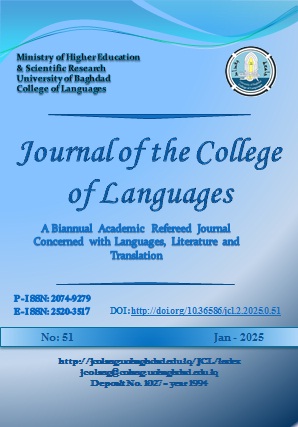التحليل الوجداني لسورة يوسف في الخطاب الحجاجي في ضوء نظرية كريستين بلانتين
تحلیل پاتوس در گفتمان حجاجی سورۀ یوسف براساس نظریۀ کرستیان پلانتین
DOI:
https://doi.org/10.36586/jcl.2.2025.0.51.0285الكلمات المفتاحية:
الحجاج، الوجدان (الانفعالات)الملخص
إن أحد استخدامات اللغة للتأثير على الآخرين هو الحجاج، حيث تستخدم الحجج لإقناع المتلقي لأنها تحاول إقناع المتلقي بأن هذا التفكير صحيح أو لصالحه، والنموذج الثالث في أبحاث هذه النظرية (نظرية كريستيان)، والذي يعد امتداداً لأبحاث شاييم بيرلمان في اتجاه إحياء البلاغة الأرسطية، يدرس الاستدلال داخل الخطاب، ويتم تحليل التأثير على المتلقي وتصنيفه ، وبما أن القرآن الكريم يحتوي على خطابات تتمحور حول مواضيع مثل: إنكار الشرك والوثنية، والدعوة إلى التوحيد، والدعوة إلى العدل، وإنكار الفساد في الأرض، إلخ، فيمكننا اعتبار نص القرآن الكريم خطاباً حجاجيا، وفي هذا البحث سوف نقوم بتحليل تجليات الوجدان والانفعالات في سورة يوسف وفقاً لنظرية كريستيان بلانتين، وتظهر نتائج البحث أن إثارة المشاعر مثل: الخوف، والحب، والشفقة، إلخ، تلعب دوراً مهماً في سيرورة هذه القصة. في إقناع الجمهور.
المراجع
Al-Omari, Muhammad, (2002), on the rhetoric of persuasive speech - a theoretical and applied introduction to the study of Arabic rhetoric, rhetoric in the first century as a model, second edition, Beirut: Casablanca.
Al-Wali, Muhammad, (2005), Metaphor in Greek, Arab, and Western mahataat, first edition, Beirut: Dar Al-Aman Publications.
Al-Wali, Muhammad, (2011), Introduction to argumentative, Plato, Aristotle, and Chaim Perelman, Alam Al-Fikr Magazine, National Council for Culture, Arts and Letters, Kuwait, Issue 40, Issue 2..
Al-Moudin, Hassan, (2021), The Rhetoric of argumentative argumentative in Al-Aytous and Al-Batous, Research and Translations, The Hashemite Kingdom of Jordan: Dar Kunoz Al-Ma’rifa for Publishing and Distribution.
Al-Azzawi, Abu Bakr (2022), Enlarged argumentative, Foundations and Principles, Morocco: Waraqa Bilal Press.
Al-Rifi, Hisham, Argumentative according to Aristotle, among the most important theories of Argumentative in the Western tradition from Aristotle to today, supervised by Hammadi Samoud, Adab Series, Volume: 39, College of Art.
Amosi, Ruth, (2020), Should arguments be integrated into discourse analysis? Problems and Stakes, translated by: Jamal al-Din al-Amarti, Tunisia: Afkar Center for Studies and Research.
Al-Ansari, Ibn Hisham, (1367), Mughni Al-Labib from the Books of Arabs, Qom, Tabrizi Publications, Third edition..
Al-Hashemi, Ahmed, (1389), Javaher al-Balagha, translator: Hasan Irfan, vol. 1 and 2, 10th edition, Qom: Balaghat Publishing House.
Benohashem, Al-Hussein, (2014), The Rhetoric of Argumentative: Greek Origins, Benghazi: United New Book House.
Obaid, Hatem, (2007), Al-Batus, from rhetoric to discourse analysis, Al-Fusoul magazine, Egyptian General Book Authority, Cairo, No. 70.
Soula, Abdullah, (2011), on the argumentative theory: studies and applications, first edition, Tunisia: Dar Al-Janoub for Publishing and Distribution.
Tabatabai, Muhammad Hussein (1374), Tafsir al-Mizan, translated by: Muhammad Baqir Mousavi, Qom: Islamic Publications.
Tabarsi, Fadl bin Hassan, Tafsir Majma’ al-Bayan, translated by: Hashim Rasouli, Tehran: Farahani Publishing.
Tarrous, Muhammad, (2005), Argumentative Theory through Rhetorical, Logical, and Linguistic Studies, Amman: Dar Al-Thaqafa.
The Status of Emotions in argumentative Theories, Alam Al-Fikr Magazine, National Council for Culture, Arts and Letters, Kuwait, Issue 40, Issue 2. (2011),
Zamil, Abdulameer Chasib, 2024, Journal of the College of Languages, Issue 49, p. 226-
التنزيلات
منشور
إصدار
القسم
الرخصة
الحقوق الفكرية (c) 2025 مجلة كلية اللغات

هذا العمل مرخص بموجب Creative Commons Attribution 4.0 International License.








